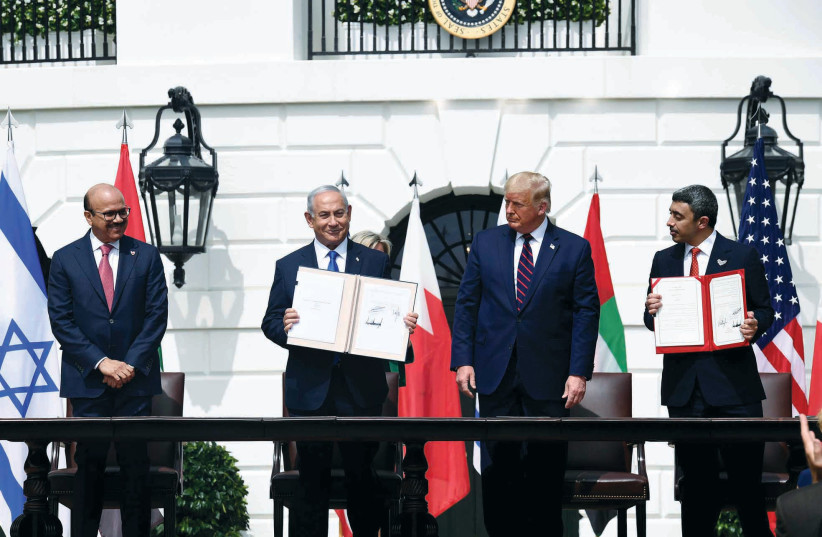
The Abraham Accords were a surprise to most of the world. Although Israel had already opened an international diplomatic office in the United Arab Emirates (UAE) in 2015, and the worst-kept secret in the Middle East for years was Israel’s security cooperation with Arab Gulf countries, there is a difference between clandestine cooperation and openly signed agreements. On September 15, 2020, Israeli Prime Minister Benjamin Netanyahu, American president Donald Trump, and the foreign ministers of the United Arab Emirates and Bahrain signed normalization accords on the White House lawn.
Most of the world was excited about the accords. Israel was accepted by Arab countries and they marked the beginning of the end of the Arab-Israeli conflict. It didn’t escape anyone’s attention that the UAE wouldn’t sign an accord with Israel without Saudi Arabia’s approval. This put Israel one step closer to signing a normalization deal with Saudi Arabia, another country Israel has secretly been dealing with on security issues.
Besides the obvious benefits to security and the economy, the Abraham Accords were beneficial to Israel because they unburdened it from the rock around its neck of Palestinian intransigence and the Israeli-Palestinian conflict that held it back from normalization with Arab countries. All too often, Israel heard that it would never be able to normalize with Arab countries until the Israeli-Palestinian conflict was solved.
The problem Israel was faced with in solving this conflict was that the Palestinians refused to make the compromises necessary to sign a peace agreement with Israel. They spent decades refusing to recognize Israel, and when they did, they still refused to take the obvious step of ending terrorism. Palestinians also refused to compromise on border details, Israel’s legitimate security concerns, and insisted on the absurd Palestinian demand for the return of all Palestinian descendants who lived all across the world and the establishment of a Palestinian capital in Jerusalem. As long as the Palestinians violently attacked Israel through terrorism and rocket fire, and refused to compromise for peace, Israel couldn’t move forward on signing accords with the Arab world.


The Abraham Accords was the first time Arab countries were prepared to normalize with Israel without concern for advancement on the Palestinian issue. With the signing of the accords, the Palestinians were no longer the gateway for Israel to normalize relations with Arab countries. The Palestinians would now have to recognize that they had to stop their terrorism and compromise; no longer could they count on an Arab boycott of all things Israel.
Palestinian anger over the Abraham Accords
Not everyone was excited about the Abraham Accords. Palestinians and their advocates challenged Israel and her supporters by asking what was achieved by the Accords. They pointed out that Israel was never at war with the UAE, Bahrain, Morrocco, or the Sudan. They argued these agreements were mostly for show and didn’t help Israel or the region at all.
PALESTINIANS ALSO argued against the Abraham Accords, positing that not only did they achieve very little, but they also damaged Israel’s prospects for peace and made the region a much more dangerous place. Their argument assumed that the Abraham Accords were built on the premise that Israel could dodge the Palestinians, and deal with them while normalizing with Arab gulf states.
Their reasoning further claimed that Palestinians took umbrage at the Abraham Accords. They were inflamed by being sidestepped in favor of other Arab countries and began planning their revenge. They were dead set on stopping any further agreements between Israel and Arab countries, especially with Saudi Arabia. When the rumors began that Israel was going to be signing a deal with the Saudis, the Palestinians, represented by Hamas, attacked on October 7. Their argument surmised that the Palestinians demonstrated that not only did the Abraham Accords not make Israel safer, but, bypassing the Palestinians, it made Israel much less safe.
It’s important to answer these claims by noting that the goal of the Abraham Accords wasn’t to make Israel safer from the threat of Palestinian terrorists, but from Iranian nuclear aggression. Reasoning that the Abraham Accords should have solved all of Israel’s security issues and then calling them a failure when they didn’t, set an impossible-to-meet metric for the Accords. The Abraham Accords were signed to strengthen the global coalition opposing Iran and open up new avenues of trade and cooperation in non-traditional areas.
The Abraham Accords didn’t encourage Palestinian terrorism or the Simchat Torah massacre on October 7. Palestinians have used terror as a manifestation of their hate of Jews long before 1948, going back to riots in 1834. Terrorism and violence has been the traditional Palestinian reaction to Jews, and later on in their development, to Zionism and the State of Israel.
The Hamas and Palestinian attacks on October 7 were precipitated by a Palestinian culture of hate and violence.
Zionists will stay true to their philosophy of striving to make peace with all of their neighbors. The Palestinians and their supporters should ask why some Arab countries can make peace with Israel while the Palestinian response – for over 100 years – has been terror and hate. The international community is looking for a restart at the end of the war in Gaza. A healthy first step would be a change in the Palestinian approach – from rejection and terrorism against Israel to acceptance and peace with Israel.
The writer is a Zionist educator at institutions around the world and recently published a new book, Zionism Today.

